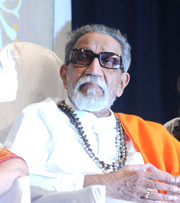
By Ajay Kumar
Free speech is a fundamental right enshrined in the Indian Constitution, yet certain members of the Indian police appear to have difficulty extending this principle to cyber speech on Facebook. India’s intolerance with police, particularly in instances involving religious topics, have over zealously acted to arrest Facebook users who post things they believe harm “social harmony” or “creates tension”.

Following the death of the Hindu and Marathi nationalist leader Bal Thackeray, the city of Mumbai shut down for a day in observance of the period of mourning. On November 18th, Shaheen Dhada a 21 year old graduate posted on Facebook, “Every day thousands of people die, but still the world moves on. … Today, Mumbai shuts down out of fear, not out of respect.” Her friend Renu Srinavasan “liked” the post. Within ten minutes the police showed up at her door and took her into custody, and also arrested her friend while an angry mob of Shiv Sena (Shiva’s Army) supporters attacked her uncle’s clinic, smashing windows. Dhada, a Muslim, was charged with “promoting religious enmity” against Hindus.
The incident sheds light on two disturbing things: firstly, the fact that the Mumbai police appear to have been swept away in the fervor of mob-fueled anger, prompting them to arrest two girls who commented on the passing of a right-wing nationalist politician; secondly, the arrest reveals the sweeping and undemocratic nature of India’s Information Technology Act that governs electronic speech.
Rising of India’s Intolerance for Speech?
The section under which Dhada was charged prohibits speech that causes “annoyance, inconvenience, danger, obstruction, insult, injury, criminal intimidation, enmity, hatred or ill will.” The Act is so wide in its scope that almost anyone could potentially be arrested for comments they make on the internet. Two months earlier, the police had arrested a political cartoonist for a cartoon that mocked corruption in the Indian government, charging him with sedition. A university professor in West Bengal was arrested for an email that contained a caricature of the chief minister. A businessman in Puducherry was arrested for a tweet criticizing the son of the finance minister.
To its credit, the Indian Supreme Court has ordered the state government to explain the reason for the arrest. The two policemen who arrested the girls have also been suspended while the magistrate who approved the arrest and the bail has been transferred.

The telecommunications minister has also released new guidelines for the Information Technology Act, ostensibly making it more difficult for people to be arrested under the Act. Yet, it seems that the Indian police are not so tolerant. On December 8th, a 20 year old student was arrested for posting a picture on Facebook depicting a Hindu god Hanuman sitting on top of a mosque. The police chief commented to Times of India, “We got the smell of tension. Three software specialists were pressed into service to find out the source of the controversial picture. Finally, Pintu Sahu’s account was located.”
Allowing the police to dictate the type of comments people may post online is more characteristic of a police state than a democratic country. While the police may be forced to release the individual they wrongfully arrested, the Act gives them a blanket of safety to hide behind. More troubling is that even if the arrest is found wrongful, there is now a chilling effect on free speech in India. People who hear about cases like these as well as the individuals who were arrested will be hesitant to use the free-speech rights they are entitled to out of fear. Indian civil society and public discourse will be strangled if these kinds of incidents continue. For India to maintain itself as a democratic country that respects principles of free speech, it must repeal the over-broad Information Technology Act and work to rein in the overzealous Indian police who feel empowered to arrest anyone they see fit.
Leave a Reply